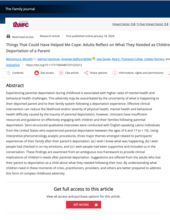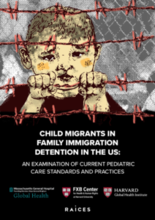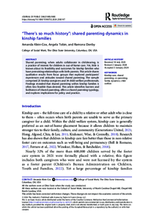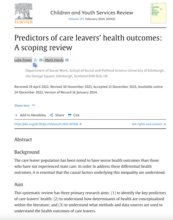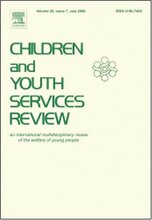Displaying 101 - 110 of 2221
This report presents findings from qualitative interviews conducted with English-speaking Latino individuals from the United States who experienced parental deportation between the ages of 6 and 17 years old. They offer suggestions about what they needed following their loss as a child. By understanding what children need in these moments of crisis, practitioners, providers, and others are better prepared to address this form of complex childhood adversity.
In more than 700 cases over five years, Georgia reported inadequate housing as the sole reason for taking a child into foster care, a WABE and ProPublica analysis found. Advocates say it would be cheaper to help families get housing.
The study is the first analysis of the medical records of children as young as six months old and a median age of nine years old detained between June 2018 and October 2020 at Karnes County Family Residential Center in Texas. The report documents evidence of mental and physical harm relating to inadequate and inappropriate medical care experienced by children during prolonged detention.
Shared parenting, when adults collaborate in childrearing, is a practice of interest for children in out-of-home care. Yet, little is known about its feasibility and outcomes for kinship families who have preexisting relationships with birth parents. This article shares qualitative results from focus groups that explored participants’ experiences and attitudes toward shared parenting in the U.S.
Beginning this month, Washington officials have new authority to root out abuse and neglect of children housed in private boarding schools, residential treatment centers and the state’s school for the deaf. Senate Bill 5515 tasks the Department of Children, Youth and Families with investigating allegations and approving licenses for facilities that had previously been beyond the scope of the child welfare agency.
This 2023/2024 Prevention Resource Guide offers critical information, including concrete examples of how grant recipients and other Federal or national agencies are taking bold actions to authentically engage with and support families.
Since 2021, migrant children have been traveling alone to the United States in record numbers: Nearly 400,000 children have crossed the southern border by themselves, most of them fleeing extreme poverty.
This systematic review contained studies that were mostly based in the U.S. and had three primary research aims: (1) to identify the key predictors of care leavers’ health; (2) to understand how determinants of health are conceptualised within the literature; and (3) to understand what methods and data sources are used to understand the health outcomes of care leavers.
This longitudinal study evaluates the effectiveness of BLINDED intervention, an intervention that utilizes family search and engagement practices to place children who enter foster care in kinship placements as quickly as possible in the U.S.
This is a systematic review of literature published from 2002 to 2022 to assess the differences in outcomes of children and youth who were adopted out of foster care compared to children and youth in foster care (CYFC) who were in other permanency placements (reunified, aged out, long-term foster care). The review yielded twelve (N = 12) studies from Sweden, the United Kingdom, and the United States.

